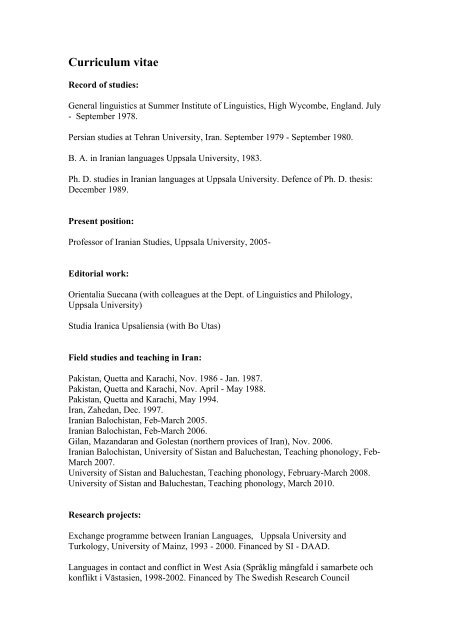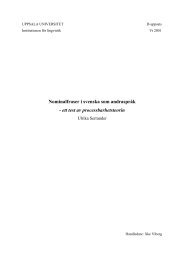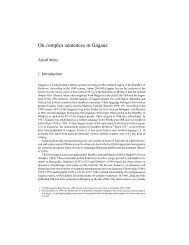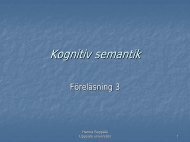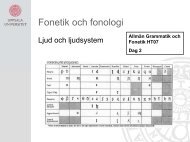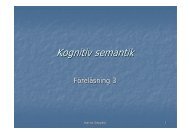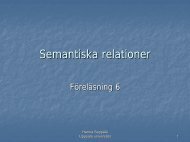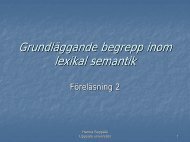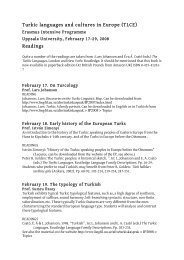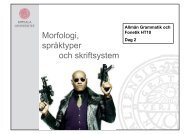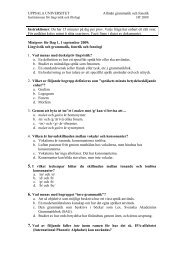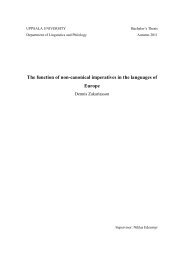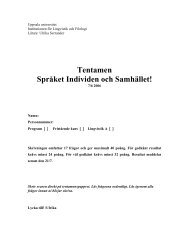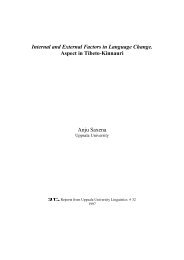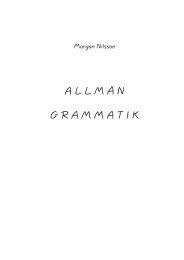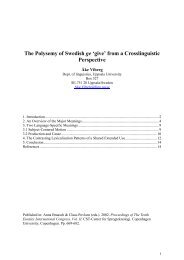Curriculum vitae
Curriculum vitae
Curriculum vitae
Create successful ePaper yourself
Turn your PDF publications into a flip-book with our unique Google optimized e-Paper software.
<strong>Curriculum</strong> <strong>vitae</strong><br />
Record of studies:<br />
General linguistics at Summer Institute of Linguistics, High Wycombe, England. July<br />
- September 1978.<br />
Persian studies at Tehran University, Iran. September 1979 - September 1980.<br />
B. A. in Iranian languages Uppsala University, 1983.<br />
Ph. D. studies in Iranian languages at Uppsala University. Defence of Ph. D. thesis:<br />
December 1989.<br />
Present position:<br />
Professor of Iranian Studies, Uppsala University, 2005-<br />
Editorial work:<br />
Orientalia Suecana (with colleagues at the Dept. of Linguistics and Philology,<br />
Uppsala University)<br />
Studia Iranica Upsaliensia (with Bo Utas)<br />
Field studies and teaching in Iran:<br />
Pakistan, Quetta and Karachi, Nov. 1986 - Jan. 1987.<br />
Pakistan, Quetta and Karachi, Nov. April - May 1988.<br />
Pakistan, Quetta and Karachi, May 1994.<br />
Iran, Zahedan, Dec. 1997.<br />
Iranian Balochistan, Feb-March 2005.<br />
Iranian Balochistan, Feb-March 2006.<br />
Gilan, Mazandaran and Golestan (northern provices of Iran), Nov. 2006.<br />
Iranian Balochistan, University of Sistan and Baluchestan, Teaching phonology, Feb-<br />
March 2007.<br />
University of Sistan and Baluchestan, Teaching phonology, February-March 2008.<br />
University of Sistan and Baluchestan, Teaching phonology, March 2010.<br />
Research projects:<br />
Exchange programme between Iranian Languages, Uppsala University and<br />
Turkology, University of Mainz, 1993 - 2000. Financed by SI - DAAD.<br />
Languages in contact and conflict in West Asia (Språklig mångfald i samarbete och<br />
konflikt i Västasien, 1998-2002. Financed by The Swedish Research Council
(Vetenskapsrådet), Stockholm, Sweden. Head of project.<br />
Language, identity and society – a documentation of minority language in Iran, their<br />
sociolinguistic milieu and the role of the language in individual and group identity. In<br />
cooperation with the Department of English and Linguistics, University of Sistan and<br />
Balochistan, Iran. Financed by the Swedish Research Council-SIDA, Swedish<br />
Research Links. Head of projects. 2007-2010.<br />
Documentation of the language and lifestyle of the Galesh, province of Golestan, Iran<br />
Documentation project PPG0043. Pilot project financed by Endangered Languages<br />
Documentation Project, SOAS, London. Together with Guiti Shokri and Hossein<br />
Barani.<br />
Symposium and workshop organisation:<br />
Symposium on the Balochi language, Uppsala, May 1997.<br />
Presentation: Language maintenance and language attitudes among Baloch in<br />
Sweden.<br />
2nd international symposium on the Balochi language, Uppsala, 17-20 Aug. 2000.<br />
Presentation: The case system in Iranian Balochi from a contact linguistic perspective.<br />
3rd international conference with focus on Balochistan: Pluralism in Balochistan,<br />
Uppsala, 18-21 Aug. 2005.<br />
Presentation: Relative clauses in Balochi and the marking of the antecedent. Influence<br />
from Persian<br />
Workshop on research methods in phonetics with a particular aim towards researchers<br />
and students from Iran. In cooperation with Dr. Pétur Helgason, Dept. of Linguistics<br />
and Philology, Uppsala University. To be held in Uppsala, 13-16 August 2007.<br />
Languages and dialects in Iran. International conference on documentation of<br />
minority languages in Iran and their sociolinguistic milieu. In cooperation with the<br />
University of Sistan and Balochistan, Zahedan, Iran, and other international<br />
researchers. Zahedan 28-31 October 2008.<br />
Presentation: Hypotactic constructions in spoken and written Balochi.<br />
FLEX (Field Works Language Explorer)<br />
Workshop I in Uppsala, April 2009 (led by Daniel Paul, SIL International)<br />
Workshop II in Uppsala, April 2010 (led by Ron Lockwood, SIL International)<br />
Participation in other international conferences and workshops than those<br />
organised by myself (see above):<br />
Types of Evidentiality in Turkic, Iranian ande Neighbouring Langauages, held at the<br />
Swedish Research Intitute in Istanbul, April 1997. Organisers: Lars Johanson and Bo<br />
Utas.<br />
Presentation: Indirectivity in spoken Modern Persian.
Areas of Iranian-Semitic-Turkic Convergence. Linguistic Contact in Western and<br />
Central Asia in Past and Present. held at Uppsala University 18-20 May 2001.<br />
Organisers: Eva Csato Johanson and Bo Isaksson.<br />
Presentation: The glottal plosive in Persian. Semitic influence<br />
Culture and Society in West and Central Asia – The role of the State, held at the<br />
Swedish Research Intitute in Istanbul, 14-16 November 2002. Organisers: Annika<br />
Rabo and Bo Utas.<br />
Presentation: State control and language in Balochistan<br />
The Second International Conference on Language Variation in Europe. Uppsala<br />
University, June 12-14, 2003. Organisers: Britt Louise Gunnarsson et al.<br />
Presentation: Language maintenance among Iranian immigrants in Sweden.<br />
The Second International Conference on Iranian Linguistics, Leipzig June 2005.<br />
Organisers: Donald Stilo, Sima Karimi, Vida Samiian.<br />
Presentation: Expressions of future in Persian<br />
Workshop on Documentation of Iranian Linguistics, Kiel Aug. 2007.<br />
Organiser: Geoffrey Haig<br />
Presentation: Documentation of Balochi, an overview.<br />
International Conference of Larestan Philology and Ethnology, organised by the<br />
Municipality and Islamic Council of Lar, Iran. 14-15 March 2009.<br />
Individual presentation: On u-fronting in languages and dialects of southern Iran<br />
Presentation with Maryam Nourzaei (by Maryam Nourzaei): Observations on the<br />
language and ethnography of the Koroshis in Fars.<br />
Iranian linguistics, Ferdowsi University, Mashhad, 24-25 Feb 2010 (absent).<br />
Presentation together with Maryam Nourzaei (by Maryam Nourzaei): Ergativity in<br />
Koroshi.<br />
Supervision of Ph.D. projects:<br />
Completed:<br />
Forogh Hashabeiky. Persian Orthography. Modification or Changeover (1850-<br />
2000). Defended in April 2005. Assistant supervisor.<br />
Helena Bani-Shoraka. Language Choice and Code-Switching in the Azerbaijani<br />
Community in Iran. Defended in June 2005. Main supervisor. This thesis received the<br />
Westin prize of best Ph.D. thesis in the “philological class” of the year from the<br />
Kungliga Humanistiska Vetenskapssamfundet in Uppsala.<br />
Serge Axenov, The Balochi Language of Turkmenistan. A corpus-based grammatical<br />
description. Defended in Jan. 2007. Main supervisor.<br />
Dariush Kargar. Iranian conceptions of the Other World. Defended in Jan. 2010. Main
supervisor.<br />
Ongoing:<br />
Behrooz Barjasteh Delforooz. A comparative study of the verbal system of Brahui<br />
and Balochi as spoken in Iranian Sistan. Main supervisor.<br />
Behrooz Shojai. Ergativity in Kurmanji. Main supervisor.<br />
Anders Widmark. Pashto short story writing. Main supervisor.<br />
Farhad Shakely. Personal background Classical Kurdish Poetry (Mala-yē Jazīrī).<br />
Main supervisor.<br />
Padideh Pakpour. Identity and language in Rasht. Main supervisor.<br />
Farideh Okati. The vowel system in Balochi. A phonetic-phonological study.<br />
Assistant supervisor.<br />
Mojgan Seraji. Computational linguistics. Assistant supervisor.<br />
Supervision of MA-theses in Iran<br />
Farideh Okati. Sistani Phonology. Spring 2008. University of Sistan and Baluchestan,<br />
Zahedan, 2nd supervisor.<br />
Somajeh Mohammadi. Syntactic errors in L2 Persian compositions by Baloch primary<br />
school pupils in Iranshahr. Spring 2009. Allameh Tabatabai University, Tehran. 2nd<br />
supervisor.<br />
Maryam Nourzaei: The verb system of Koroshi. A corpus based description. Autumn<br />
2009. Shiraz Azad Islamic University of Science and Research. Defence 11 March<br />
2010. Main supervisor.<br />
Personal background<br />
I grew up as the only child of quite elderly parents, who both had received only<br />
primary education. I had no intent of pursuing my studies beyond intermediate level<br />
when I started grade seven. However, at that time I got a teacher in English and<br />
French who encouraged me enormously and arouse my interest in languages. I<br />
therefore chose to continue my studies on secondary level and tried to study as many<br />
languages as possible. During the summers of 1976 and 1977 I travelled to Europe<br />
(France, Belgium and Spain) with an international Christian youth organisation called<br />
Operation Mobilisation.<br />
My first contact with Iran was indirect. In the summer of 1975 I was given a<br />
scholarship to go to England on a language course, and the family I stayed with were<br />
planning to go to Iran to work in the British-Iranian oil industry. They talked about<br />
Iran for a whole month, how rich they would become etc., and the word "Iran" stayed
in my mind. The Christian youth organisation I got in touch with shortly after also<br />
had a one- year "Language and Culture training programme" in Iran, which I planned<br />
to attend as soon as I had finished my secondary education. I prepared myself by<br />
studying as much as I could about Iran during my final year in High School.<br />
My dream came true, and I went to Iran in the autumn of 1978 together with about<br />
10 other youth from Europe and the USA. As soon as we arrived the Islamic<br />
Revolution got underway, and it was not safe for us to stay in the country. At that<br />
time I was very confused as to what to do, since my mind was so strongly set on<br />
learning Persian and staying in Iran. However, God gave me a word of comfort from<br />
Psalm 121 (the final verse) which says: "God will protect your going out and your<br />
coming in from now and forever". The whole group went to Pakistan, and we got the<br />
option of studying Urdu or continuing with Persian. I opted for the latter.<br />
During my time in Pakistan I also heard about Iranian languages, related to<br />
Persian, but spoken in Pakistan, and I started to take an interest in one of them,<br />
Balochi. The year with the Christian youth organisation thus strongly formed the rest<br />
of my life. After returning to Sweden I applied for a student's visa to study Persian in<br />
Iran. It was granted and I returned to Iran in October 1979. This time I stayed in Iran<br />
for a year, and studied Persian at a mainly closed university due to the Cultural<br />
Revolution. I managed to acquire a fairly good proficiency in spoken Persian,<br />
something that has been of invaluable help to me in my studies and research later on.<br />
When the war between Iran and Iraq broke out I left Iran for good and started to<br />
study Iranian languages at Uppsala University, Sweden. However, I have visited Iran<br />
several times afterwards, once to meet my husband's family, once to participate in a<br />
seminar for Persian teachers, and, more recently, several times to do field research on<br />
Balochi, teach MA courses in Linguistics and establish contacts with universities in<br />
Iran, particularly in Balochistan but also in Tehran, Gilan, Mazandaran, Golestan,<br />
Semnan and Shiraz (see also reports from journeys).<br />
Research profile:<br />
My interest in the Baloch and Balochi made me choose a subject for my dissertation<br />
that was related to that language. In October 1986 I and our one-year-old daughter<br />
Maria went to Pakistan for three months. My husband came to visit us once. It was,<br />
of course, an adventure to go to Pakistan with a small child, but fortunately enough<br />
we were able to stay with a Swedish woman who was employed by the UN in Quetta.<br />
I had already started studying Balochi and was during this first field trip able to build<br />
up a network of contacts with Baloch literary men and get underway with my<br />
dissertation work.<br />
Since then the main part of my research has been concentrated on different aspects<br />
of the Balochi language and literature. I have studied both structural and<br />
sociolinguistic aspects and I have also made some studies in literature. The<br />
sociolinguistic aspect is strong in the dissertation, which dealt with the issues of<br />
standardisation and orthography. I have also studied language maintenance and<br />
language attitudes, both among the Baloch and also among other ethnic groups from<br />
Iran living in Sweden.<br />
My studies of the grammatical structure of Balochi have been mainly concentrated<br />
on dialects spoken in Iran and to what degree they are subject to structural influence<br />
from Persian, a subject very little studied up to now due to the difficulties involved in<br />
making field trips to Iranian Balochistan. First I did some preliminary studies among<br />
Iranian Baloch in Sweden, and then, within the framework of the research project
"Languages in contact and conflict in West Asia", I have been able to go to Iranian<br />
Balochistan myself and also to establish contact with persons helping me to record<br />
stories, free speech etc. in different parts of Iranian Balochistan. The results of these<br />
studies have been presented in a number of articles.<br />
In literarure I have taken a particular interest in the relation between literature and<br />
society. A poet whom I have paid special attention to is Gul Khan Nasir, who was<br />
both a poet and a politician and whose poems are of a strongly nationalistic character.<br />
I am also particularly interested in folktales, and how they mirror the society in which<br />
they are told.<br />
Another main orientation of my research is towards structural and sociolinguistic<br />
aspects on New Persian and minority languages in Iran. I have studied Persian<br />
phonology (pronunciation of the glottal plosive), and morphosyntax (marking of the<br />
antecedent of restrictive relative clauses, syntax of the preterite versus the present<br />
perfect verb forms). The study of relative clauses is based on a text corpus spanning<br />
over more than 1000 years, and the studies of the glottal plosive and verb<br />
morphosyntax are based on recordings of the spoken language.<br />
I have also studied language maintenance and patterns of language use among<br />
Iranian immigrants in Sweden. These studies have been presented in two different<br />
articles, one concentrating on a the Baloch from Iran and one which compares these<br />
findings with linguistic behaviour among speakers of Persian and Armenian. In<br />
another article I have described linguistic behaviour in an Iranian-Swedish family<br />
which I have studied over a prolonged time through participant observation and<br />
interviews.<br />
Within the framework of the project ”Language, identity and society – a<br />
documentation of minority language in Iran, their sociolinguistic milieu and the role<br />
of the language in individual and group identity” a network is being formed for the<br />
study of minority languages of Iran. Apart from Balochi, we have also been able to<br />
carry out documentation and sociolinguistic surveys in the following areas:<br />
Mazandaran, Ziarat (in cooperation with Guiti Shokri and Hossein Barani).<br />
Documentation of the langauge and lifestyle of cow-herding Galesh in and around<br />
Ziarat, Mazandaran.<br />
Koroshi in Fars (which can be regarded as a dialect, although quite a distinct one, of<br />
Balochi) (in cooperation with Maryam Nourzaei).<br />
Sistani (particularly phonological description) (in cooperation with Farideh Okati and<br />
Abbas Ali Ahangar)<br />
Kumzari, Larak Island (sociolinguistic survey) (fieldwork by Erik Anonby and<br />
Pakzad Yousefian)<br />
Brahui in Sistan (fieldwork by Behrooz Barjasteh Delforooz)<br />
Jadgali in Southern Balochistan (fieldwork by Behrooz Barjasteh Delforooz and<br />
Serge Axenov)<br />
Semnani (sociolinguistic survey of the province of Semnan) (fieldwork by Alexander<br />
and Mirjam Kolbitsch)


